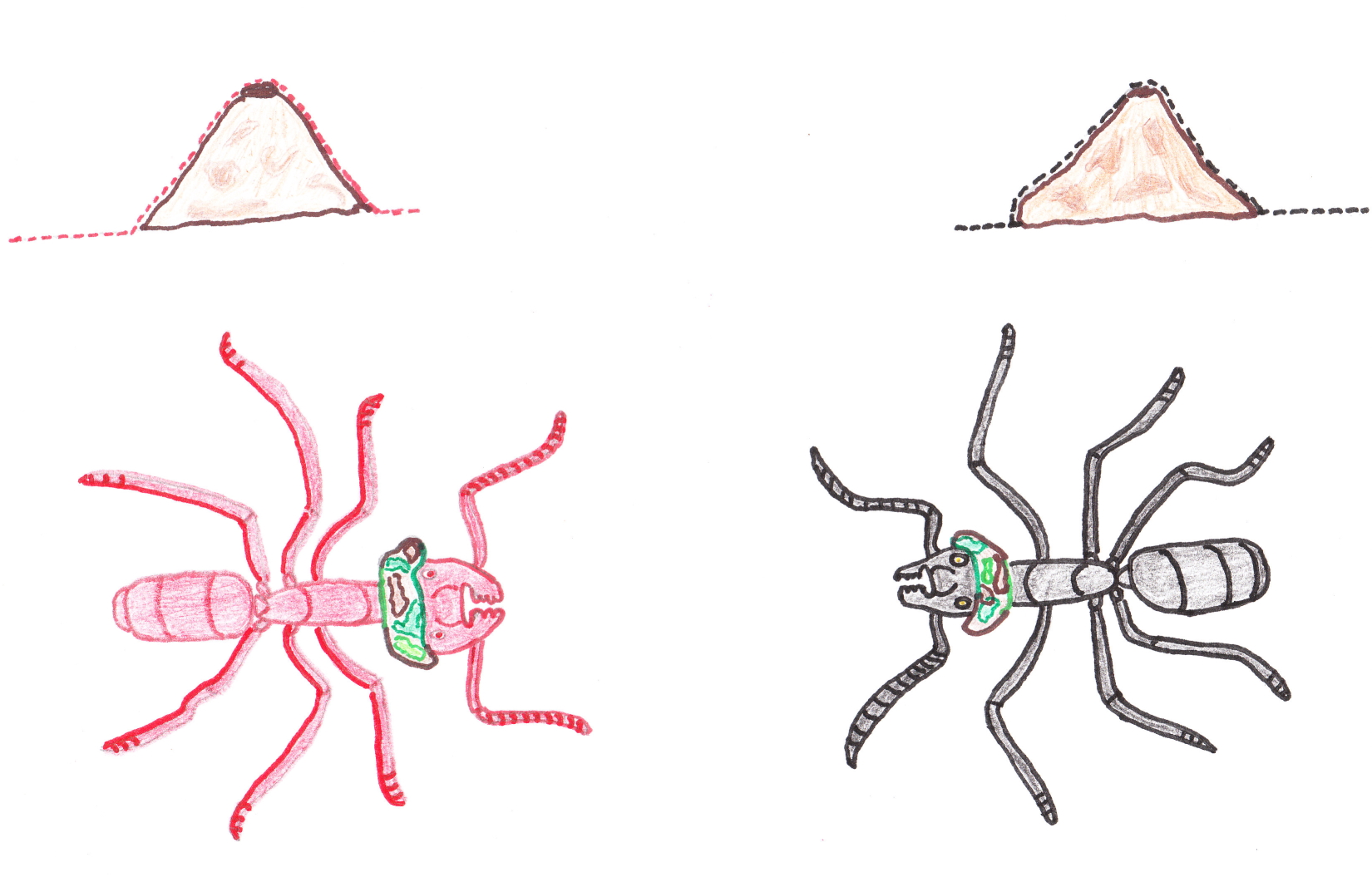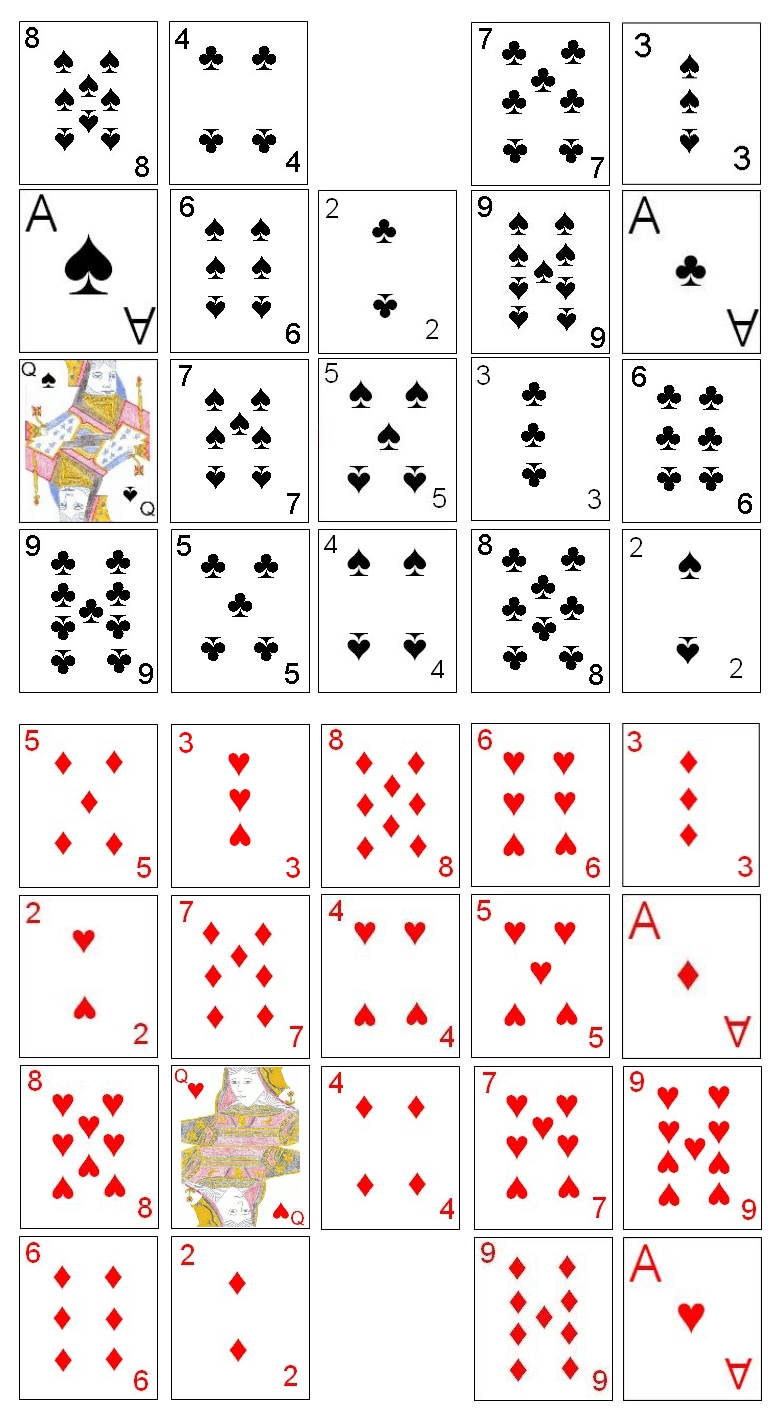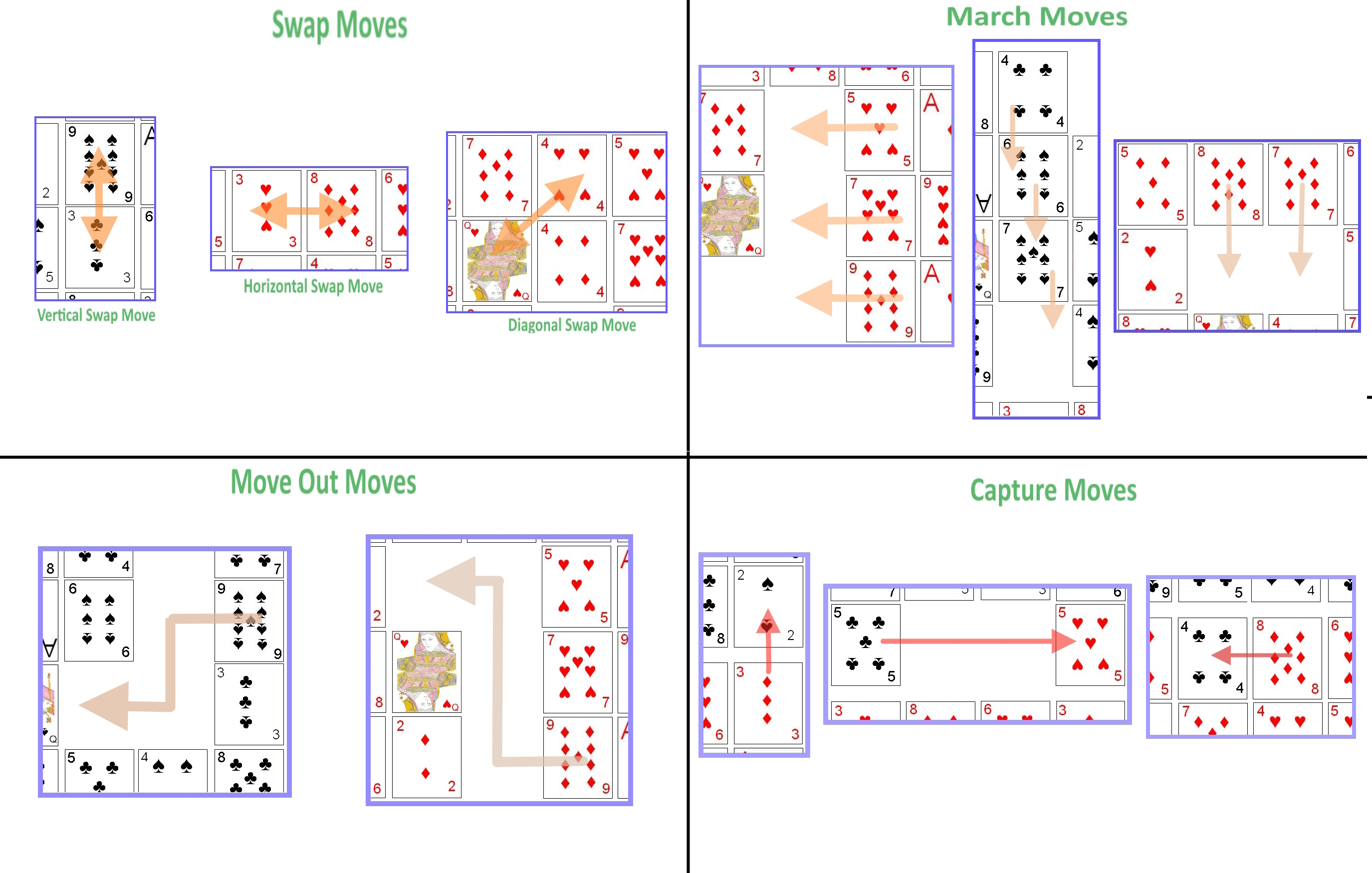
 Army Ants is a unique two player strategic game that was first published online at the Misty Moon
Games web site. Although that site is currently no longer accessible, there are several locations online that feature this game. The rules are also described on this page.
Army Ants is a unique two player strategic game that was first published online at the Misty Moon
Games web site. Although that site is currently no longer accessible, there are several locations online that feature this game. The rules are also described on this page.
Army Ants is a layout type game and simulates a battle between two colonies of army ants, the red ants and the black ants. Before play, each player should be given a specific set of cards from a standard deck. One player given all the red cards from the deck (cards in the suit of hearts and diamonds) in the ranks of Ace, 2, 3, 4, 5, 6, 7, 8, and 9. In addition that player should be given one red Queen. This player will represent the colony of red ants. Meanwhile, the opponent would similarly get the black cards (cards in the suits of spades and clubs) in each of the denominations Ace, 2, 3, 4, 5, 6, 7, 8, and 9 as well as one black Queen. This player represents the black ant colony. The relative ranking of all these cards as used for this game is as follows, from highest to lowest: 9, 8, 7, 6, 5, 4, 3, 2, Ace, Queen.
The game itself is played on a sort of virtual grid or board of 8 rows of 5 cards each. At the start, this grid is divided in half, with one half this grid controlled by the red ant player and the other half of the board by the blank ant player.
To start each player randomly shuffles his stack of 19 cards and then deals out these out on his side of the grid. He deals these out first in three rows of five cards each, and then, in the back row, furthest from the center of the grid, he deals out four cards, leaving the center space in that row empty (with no cards found in it). These cards are dealt face-up to the grid, each player filling out his side of the grid with these cards as randomly dealt.
The game is actually played in two phases. First is the setup phase and then upon it's conclusion is the battle phase. In the initial setup phase of the game, each player may make five moves on his side of the board (in turns). The red ant player has the first move and the turn then alternates amongst the two players. However, if one player finds that his queen was dealt anywhere on his top line of cards (closest to his opponent's front line of cards), he may, instead of making any of his five moves during the setup phase, alternately opt to play a "Queen's Gambit", in which he simply moves his Queen from it's current position where it is found on that front line, to the one empty space at the back line on his side of the game grid. However, a player using the Queen's Gambit option is not entitled to make the normal five moves during the setup phase and thus, a player who has made any other moves, cannot then opt for the Queen's Gambit. During the setup phase, the player may only make March moves and Swap moves (see below), or the Queen's Gambit, where appropriate and, during this setup phase a player may never move any of his card onto the side of the board on which his opponents ants are arranged.
After this setup phase (in which each player has made his five moves or a Queen's Gambit), the battle phase of the game begins. The red ant player has the first move, with each move alternating amongst the two players. The ultimate goal of this game is to capture the opponent's Queen, which, once accomplished instantly wins the game for the player able to so capture this card. In order to capture his opponent's Queen, and thus win the game, the players have a variety of move types they can make on their turn:
- Swap Move: A player may swap (exchange places) two of his cards on the board that are immediately adjacent to each other either vertically, horizontally, or diagonally on the grid. A player may never make a swap move involving any of his opponent's cards.
- March Move: A March move is one in which a player may move multiple cards all at the same time through one or more empty spaces on the grid. All cards which are part of the March move must be controlled by the player and must move the same number of spaces. He may thus move a row or columns consisting of one or more cards, all as a unit, as long as all those cards are of his ant color and are all in the same row or column. These cards must all move the same number of spaces (either vertically or horizontally), and cannot pass through other cards (either of that same color or the opponent's color). They may move any number of such spaces as long as all the cards can move in an unobstructed fashion (not blocked by any other cards) and remain within the grid.
- Move Out Move: A move out move is such a move, in which a player may move one card of his ant color, any number of spaces, both vertically and horizontally, in the same move as long as there is an unobstructed path for which this card can move from it's starting position to it's ending position. The card can never move diagonally and cannot pass over or through any other cards (of either color) and must stay within the confines of the grid.
- Attack Move: An Attack or Capture move is a play a player makes on his turn in which he attacks one of his opponent's cards. The target of the Attack may be immediately adjacent or any number of spaces vertically or horizontally away from the attacking card. However, the attacking card may never pass through any intervening cards and may only travel in one direction. A card may only attack a card controlled by his opponent, and that card must be of the same or lower ranked. If the attacker and defender are both of the same rank, both cards are removed from the board. If the attacker is a higher ranked card than the defender, the defending card is removed from the board and the attacking card finishes the capture on the space previously occupied by the defending card.

The game continues with the players alternating turns until one player manages to capture the opponent's Queen on his turn. However, if the configuration of the board is such that both players only have one card remaining (the Queen) the game immediately ends in a draw. In addition, if both players make the same series of moves 4 times in succession, the game also ends in a draw.